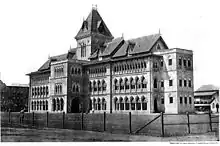Gokuldas Tejpal
Sheth Gokuldas Tejpal or Sheth Goculdas Tejpal (1822–1867) was a merchant, businessman, social reformer and philanthropist from Mumbai, India.[1][2] Gokuldas, who hailed from Gujarati Bhatia community, was well known for building charity institutions, hospitals, schools, hostels including famous Gokuldas Tejpal Hospital Gokuldas Tejpal Sanskrit College, where the first session of Indian National Congress was held On 28 December 1885.[3] He also built the Gokuldas Tejpal Anglo-vernacular high school and Gokuldas Tejpal Boarding House.[4][5][6]

Life
In 1822, Gokuldas was born in Bhatia community. His father and his uncle began life at early age as hawkers in Bombay. His father, Tejpal, passed his fortune to Gokuldas in 1833 when he died.[2] His uncle too left his own fortune to Gokuldas when he died.[2] Gokuldas died in 1867 by leaving large amounts of money for charitable institutions, including a boarding school and several other schools.[2]
References
- Srivastava, Priyanka (9 December 2017). The Well-Being of the Labor Force in Colonial Bombay: Discourses and Practices. Springer. p. 230. ISBN 978-3-319-66164-3.
- Buckland, C. E. (1999). Dictionary of Indian Biography. COSMO Publications. p. 417. ISBN 978-81-7020-897-6.
- Kamath, M. V.; Kher, V. B. (1993). The Story of Militant But Non-Violent Trade Unionism: A Biographical and Historical Study. Navajivan Mudranalaya. p. 50. ISBN 978-81-7229-049-8.
- David, M. D. (1995). Bombay, The City of Dreams: A History of The First City in India. Bombay: Himalaya Pub. House. p. 173. ISBN 9788174931283. OCLC 35151683.
- Nilesh, Preeta (1999). "Reflection on Two Prize Winning Essays on Female Education in Western Indian in the Early Nineteenth Century". Proceedings of the Indian History Congress. Indian History Congress. 60: 492. JSTOR 44144115.(subscription required)
- Directory of Educational Institutions. R. P. Bookwala. pp. 236, 239, 248.